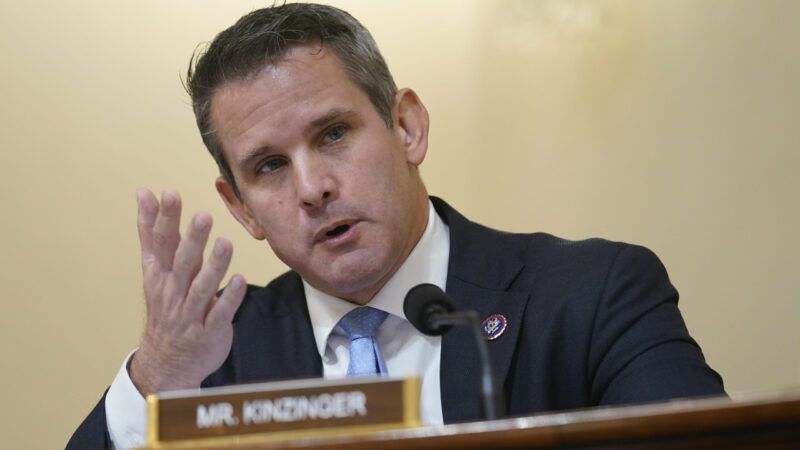New Resolution Would Allow the President To Send U.S. Troops to Ukraine
Like AUMFs before it, Rep. Adam Kinzinger’s proposed authorization would lead to less transparency in conflicts and more unilateral decision making.

Earlier this week, Rep. Adam Kinzinger (R–Ill.) proposed a new military authorization that would allow the president to introduce U.S. forces to the conflict in Ukraine if Russia uses certain weapons in its ongoing invasion. If adopted, it would be the latest installment in a decadeslong trend of Congress abdicating its constitutional role in the war-making process.
The Authorization for Use of Military Force (AUMF) to Defend America's Allies Resolution of 2022, according to Kinzinger, represents "a clear redline" that would act as "a deterrent to Vladimir Putin." Kinzinger has previously called for a U.S.-enforced no-fly zone over Ukraine, and on Sunday he said it isn't too soon for U.S. politicians to discuss the potential use of military force in Ukraine.
Like military authorizations of years past, Kinzinger's AUMF is quite open-ended and would give the president a concerning level of power to enter the war in Ukraine. Though Kinzinger claims the AUMF would give Biden "leverage" and "flexibility" in the fight against Putin, that would come at the expense of the constitutionally mandated role of Congress in American war making.
According to the AUMF text, once the president determines whether Russia has used chemical, biological, or nuclear weapons in Ukraine, he may then deploy U.S. forces as he "determines to be necessary and appropriate" in order to "protect the national security interests of the United States with respect to Ukraine" and "assist in defending and restoring the territorial integrity of Ukraine." The president wouldn't have to receive congressional approval prior to a troop deployment; rather, he would only have to determine that "diplomatic or other peaceful means alone" wouldn't protect U.S. security interests or Ukrainian territorial integrity. The AUMF text also contains a murky sunset provision: The president's authority to use the U.S. Armed Forces to defend Ukraine will "terminate the date on which the President certifies to Congress that the territorial integrity of Ukraine has been restored."
Per Article I, Section 8 of the Constitution, Congress has the sole authority to declare war. Only after a congressional declaration of war may the president direct the U.S. Armed Forces in a conflict. Unfortunately, that process has completely fallen apart—Congress last declared war in 1942. The U.S. has been involved in conflicts every decade since then thanks to presidential overreach and an increasingly deferential Congress.
That deference has come partially in the form of AUMFs similar to the one Kinzinger has proposed. Some AUMFs have either never been used or were invoked only in the short term. But the 2001 AUMF has been used by presidents to justify dozens of military operations in at least 19 countries, all allegedly to combat the organizations and individuals behind the September 11 attacks. The 2002 AUMF saw similar mission creep; despite explicitly authorizing conflict against Saddam Hussein's Iraq, the Trump administration invoked it to justify its fight against the Islamic State. AUMFs have often served as a carte blanche for presidents as they engage in conflicts, and Kinzinger's proposed authorization could very well be stretched to permit prolonged action.
Putting war declarations in the hands of Congress is supposed to ensure that American involvement in armed conflicts is properly debated, with costs and benefits discussed in public view by elected representatives. AUMFs put that power in the president's hands, allowing for less transparency in conflicts and more unilateral decision making. And strangely, Kinzinger is proposing an AUMF as many of his colleagues are working to repeal the authorizations that help enable endless wars.
The AUMF resolution is premature and comes at a time when deescalation in Ukraine is imperative. Rather than compelling lawmakers to prioritize diplomacy over conflict, it would further hobble the body that has already drastically weakened its own role in America's military engagements.
